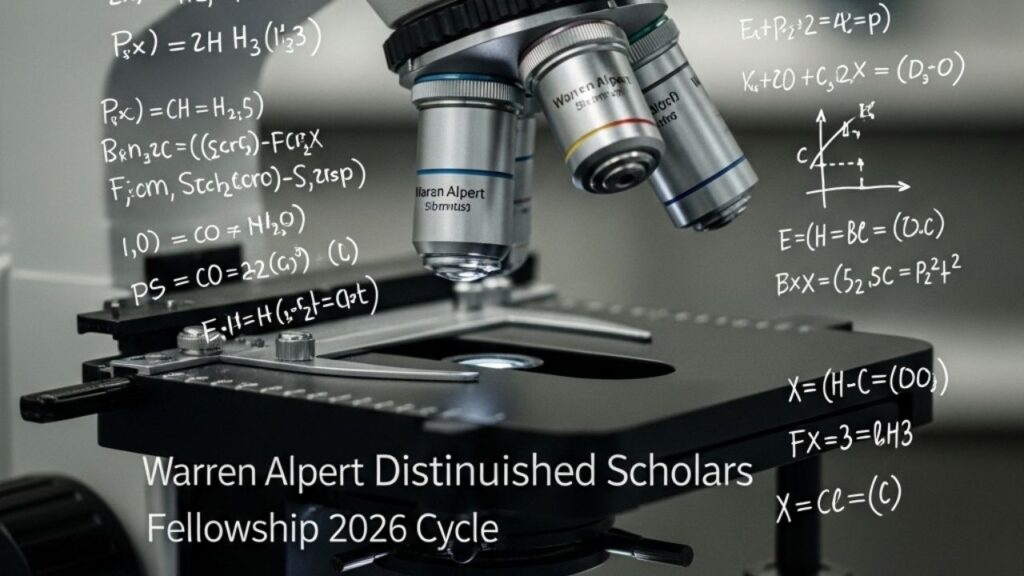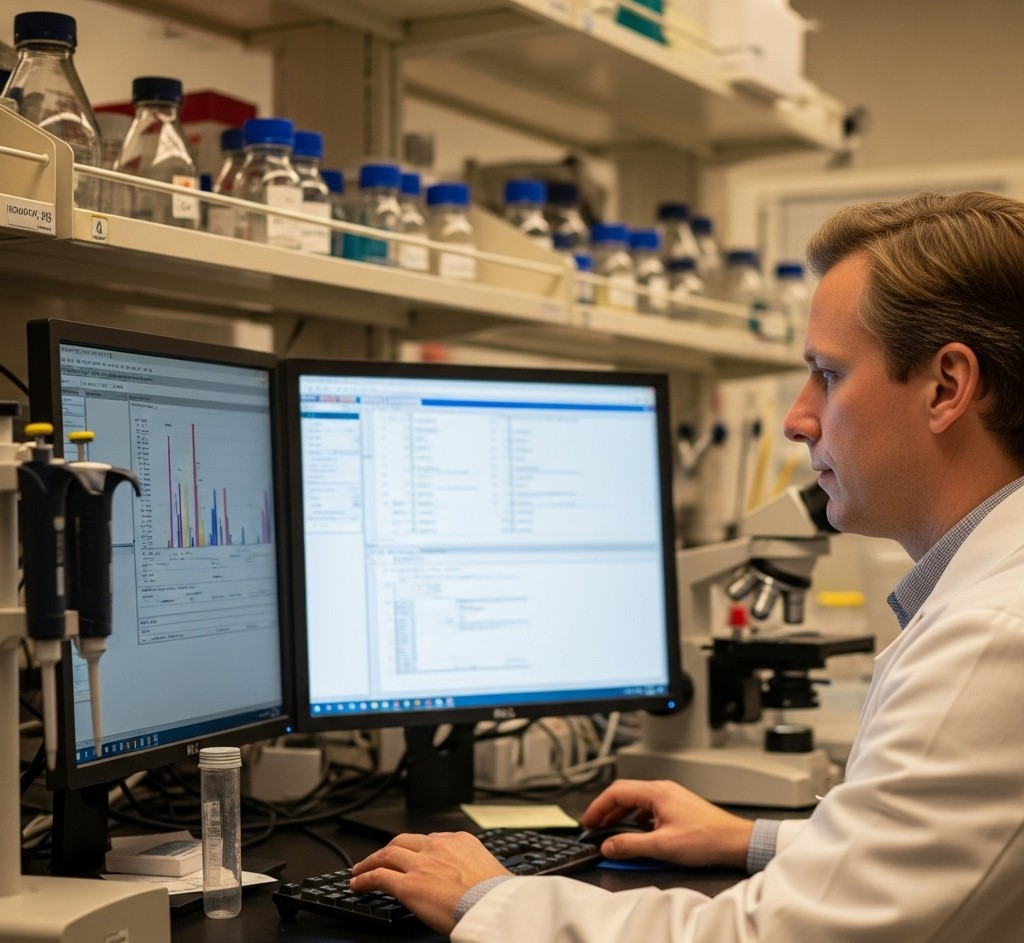Embarking on the next stage of your scientific career is an exciting, yet often challenging, journey. If you’re a postdoctoral scientist with an MD or PhD, poised to make a significant leap into an independent faculty position, the Warren Alpert Distinguished Scholars Fellowship 2026 Cycle could be the catalyst you need. This prestigious fellowship is designed to empower exceptional early-career researchers, providing the vital support to transition from mentee to independent scientific leader. As someone who has spent years observing and advising budding researchers, I can tell you that opportunities like this are truly game-changers, offering not just financial backing but also invaluable recognition for groundbreaking work.

Unlocking Your Potential: What the Fellowship Offers
The Warren Alpert Distinguished Scholars Fellowship is a beacon for those in the biomedical sciences, particularly within neuroscience and translational immunology (non-cancer). This award isn’t merely about funding; it’s about fostering the next generation of scientific pioneers. It recognizes individuals who have demonstrated exceptional creativity and success in their postdoctoral work and who propose future research that is both important and innovative.
The core objective of this fellowship is to facilitate a postdoctoral researcher’s advancement to a full-time faculty member at the Assistant Professor level or higher. It’s a transitional award, specifically structured to help you establish your own laboratory program and secure independent funding. In my experience advising students, one common hurdle is bridging that gap between rigorous postdoctoral training and the daunting task of building an independent research empire. This fellowship directly addresses that challenge.
Warren Alpert Distinguished Scholars Fellowship
| Key Fact | Detail/Statistic |
| Award Amount | $200,000 annually for two years. This covers salary, lab costs, and related expenses. Up to 15% indirect costs are included. |
| Eligibility Focus | Postdoctoral scientists (MD/PhD) with 3-6 years of postdoctoral experience by July 1, 2026, engaged in neuroscience or translational immunology (non-cancer) research. Must be nominated by institution. Warren Alpert Foundation – How to Apply |
| Award Purpose | To enable a postdoctoral researcher to advance to a full-time faculty member (Assistant Professor level or higher) and promote the development of an independently funded laboratory program. |
| Nomination Process | Applicants must be nominated by the Dean of their medical school or an equivalent institutional senior leader. The process often involves an internal competition at the institution. Research Support – Penn State University |
The Warren Alpert Distinguished Scholars Fellowship 2026 Cycle represents an extraordinary opportunity for postdoctoral scientists on the cusp of independent research careers. It’s a challenging but deeply rewarding process that demands scientific excellence, strategic thinking, and a clear vision for your future impact. By understanding the eligibility, diligently preparing your application, and leveraging the support of your institution, you significantly enhance your chances of securing this transformative award.
Eligibility: Are You the Next Alpert Scholar?
Understanding the eligibility criteria is your first crucial step. The Warren Alpert Distinguished Scholars Fellowship is highly competitive, and the requirements are precise.
- Doctoral Degree: You must hold an M.D., Ph.D., or both.
- Postdoctoral Experience: By July 1, 2026, you must have completed a minimum of three years and no more than six years of a postdoctoral fellowship. This timeframe is critical, so mark your calendar and ensure your experience aligns.
- Research Focus: Your proposed research must be in the field of neuroscience or translational immunology (non-cancer). The foundation clearly outlines these areas, so ensure your work fits squarely within one of them.
- Institutional Affiliation: You must hold a postdoctoral research position at a United States medical school, research institute, or academic institution.
- Nomination is Key: This is not an open application. You must be nominated by the Dean of your medical school or an equivalent institutional senior leader. This usually means an internal selection process at your current institution.
- Effort Commitment: A minimum of 75% effort is required for your research under this fellowship.
- Letters of Recommendation: Expect to provide three letters of recommendation, alongside a nomination letter from your institution.
- Visa Status (if applicable): If you are an applicant with a Visa, your Visa status must allow you to complete the award in the United States.

The Application Journey: A Warren Alpert Distinguished Scholars Fellowship Approach
Applying for a prestigious fellowship like the Warren Alpert Distinguished Scholars Fellowship requires meticulous planning and execution. The process is often initiated internally by your institution due to the nomination requirement.
1. Internal Nomination Process
Given that the fellowship requires institutional nomination, the first hurdle is often an internal competition at your university or research institute. Institutions typically have their own internal deadlines, which are well in advance of the sponsor’s official deadline.
- Identify Your Internal Research Office: Begin by contacting your institution’s Office of Sponsored Programs, Research Development, or Foundation Relations. They will be aware of limited submission opportunities like the Warren Alpert Fellowship and can guide you through their internal application process.
- Prepare Internal Materials: While the exact requirements vary by institution, you will likely need to submit:
- A brief research plan (often 1-2 pages, with references on a separate page).
- A description of your background and unique qualifications for the project and your career plan (often 1/2 page).
- A statement of support from your department chair or center director.
- Your NIH Biosketch or an abbreviated CV (maximum five pages).
- An email from your Dean or equivalent senior leader confirming their willingness to write a letter of nomination.
2. Crafting Your Stellar Application
Once you’ve secured your institution’s nomination, you’ll work with them to prepare the full application for the Warren Alpert Foundation. The official deadline for nominations is typically November 1st, 2025 for the 2026 cycle.
- Detailed Research Proposal: This is the heart of your application. It should be a compelling narrative outlining the importance of your project, your proposed methods, and the likely presentation of your results. Adhere strictly to page limits and formatting guidelines (e.g., NIH G300 budget format).
- Personal Statement/Background: This is your opportunity to showcase your unique strengths, experiences, and how they uniquely position you to execute your proposed research and achieve your career aspirations.
- Letters of Recommendation: Secure strong letters from mentors and collaborators who can speak to your scientific achievements, intellectual creativity, and potential for independent leadership.
- Nomination Letter: The letter from your Dean or institutional leader is crucial. It should clearly articulate why you are the ideal candidate for this prestigious award and the institution’s commitment to supporting your transition to an independent faculty role.

Beyond the Application: What Happens Next?
After submitting your application, a rigorous selection process takes place. The Warren Alpert Foundation’s selection committee, composed of eminent scientists, evaluates candidates based on scholastic achievements, academic records, the scientific merit of the proposal, and the strength of the recommendations. The foundation aims to make approximately five awards each year in the neuroscience and translational immunology categories.
Success Stories and Inspiration
The Warren Alpert Foundation has a long history of recognizing truly transformative science. While the Distinguished Scholars Fellowship is geared towards early-career researchers, looking at the laureates of the broader Warren Alpert Foundation Prize can offer immense inspiration. Many of these prize winners have gone on to receive Nobel Prizes, a testament to the foundation’s discerning eye for groundbreaking work.
Just recently, the 2025 Warren Alpert Foundation Prize honored scientists for their critical contributions to understanding HIV and developing groundbreaking treatments like lenacapavir. This highlights the foundation’s commitment to supporting research that directly impacts human health. These stories serve as a powerful reminder of the potential impact your research could have.
The Oscar Sárkány Fellowship Grant 2025/2026: Unlocking Your Research Potential
2026 Fellowships at King Abdullah University of Science and Technology
Your Definitive Guide to the NAAS Research and Curatorial Fellowship 2025
FAQ
Q1: What is the primary purpose of the Warren Alpert Distinguished Scholars Fellowship?
The primary purpose of the Warren Alpert Distinguished Scholars Fellowship is to support exceptional postdoctoral scientists in their transition to independent faculty positions (Assistant Professor level or higher) by providing funding to establish their own laboratory programs and secure independent funding.
Q2: What research areas are prioritized for the Warren Alpert Distinguished Scholars Fellowship?
The fellowship prioritizes research in the fields of neuroscience and translational immunology (non-cancer).
Q3: Can I apply for the Warren Alpert Distinguished Scholars Fellowship directly as an individual?
No, direct individual applications are not accepted. Candidates must be nominated by the Dean of their medical school or an equivalent institutional senior leader, typically following an internal selection process at their institution.
Q4: What is the funding amount and duration of the Warren Alpert Distinguished Scholars Fellowship?
The fellowship provides $200,000 annually for two years, covering salary, lab costs, and related expenses, including up to 15% indirect costs.






